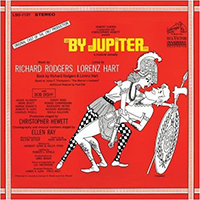
BY JUPITER
musical in two acts, music by Richard Rodgers, lyrics by Lorenz Hart, book by Richard Rodgers and Lorenz Hart based on Julian F. Thompson's The Warrior's Husband.
Produced at the Shubert Theatre, New York on June 3rd 1942. (427 perfs)
Story
Act I
The Greeks are encamped near Pontus, where Hippolyta, Queen of the Amazon Warrior-Women, reigns. They have a ticklish assignment: as one of the Twelve Labours, Jupiter has ordered Hercules to acquire the sacred girdle of Diana from around Hippolyta's waist, and it looks like being quite a fight.
At the Palace, the women soldiers are squabbling, using the usual epithets, but with a feminine slant! Three Councillors discuss Palace politics; Pomposia needs Caustica and Heroica's support to promote her son at Court with a good prospect of marriage, but first has to explain what marriage is - a strange Greek system, at which the others laugh. When Hippolyta arrives, she leads the company in a celebration of their country. Pomposia presents her son Sapiens, who instantly takes Hippolyta's fancy and flirts wickedly with her: A heavy clinch is interrupted by a herald, who announces the landing of two foreigners. Hippolyta leaves to deal with this and when she returns, she is with her huntress sister Antiope and proudly introduces Sapiens to her, saying that one of them should marry him - then quickly hustles him offstage for herself! Antiope pretends not to mind.
Theseus and Homer, the foreigners, are announced. They are effusive to Hippolyta, and Theseus sings a number that Homer has written for him which develops into a huge swing dance routine. The men demand the girdle: Hippolyta refuses and throws them out, but Theseus manages to steal back to flirt with Antiope. Another out-of breath messenger announces that an army of Greeks - MEN! - is a week's march away: Hippolyta has to marry Sapiens to get from his ambitious mother the army equipment she needs, so a marriage is hastily arranged, delayed only by Sapiens fussing over his cape and veil! Hippolyta and the army then dash off to fight and Sapiens, like all wartime spouses, starts knitting furiously.
Act II
In the Greek camp, we meet Hercules, who may be massive, but is a frightened wimp. Theseus broods on Antiope and in the Amazon camp, the sergeant broods on "The Boy I Left Behind Me". Sapiens arrives to claim his honeymoon, but even flirting and foot-stamping don't move Hippolyta. A Greek delegation enters, bringing a personal challenge from Hercules to Hippolyta; everyone drinks to the battle, Hippolyta trades girdles with Antiope so Hercules cannot grab the sacred one, and leaves. Sapiens shows Antiope how really to defeat a man - by kissing him - and she learns very quickly!
Theseus and Hercules arrive: Hercules is terrified by Antiope and takes refuge in Sapiens' tent, while Antiope and Theseus fight, until she defeats him in the special way she just learned and he happily carries her off, not knowing she is wearing the girdle! When Hippolyta returns and realises that the girdle is gone, Sapiens promises to lead the fight to get it back, as he knows how to deal with men .....
In the Greek camp, the girdle gets mislaid by Antiope in a big love scene with Theseus, and is found and tried by four nubile Greek camp-followers. When Sapiens meets them, his is electrified by their femininity and un-Amazon looks (not to speak of their behaviour). After a lot of horseplay, in which the girdle mysteriously disappears and Sapiens celebrates his new discoveries, it turns out that Antiope is off to Greece with Theseus, all the Greeks and Amazons are fraternising like anything, and Sapiens shows he has got - and is wearing - the girdle, which as King of the Amazons he presents to Hercules, though "You may have to have it let out a little!"
Characters
THESEUS |
He is strong, handsome and masterful, but not the silver-tongued negotiator that Homer is. His winning of Antiope is in the best Errol Flynn tradition - and she loves it. |
HOMER |
Shown as a war correspondent with a quick line in terrible verse - but he complains the source material is no good! Like all journalists (so they say), he never refuses a drink. However, he is daring enough to demand the belt outright for Hippolyta. |
HERCULES |
All brawn and no brain - and certainly no bravery, either: he lets Theseus and the army do all the belt-hunting, even though it's one of his Twelve Labours. |
SAPIENS |
A personable young man, eager to experience all the joys of marriage; although very masculine in his inclinations, he is an adapt gender-bender when it comes to using what we consider feminine wiles" to get his own way. The prospect of being King is delightful, too. |
HIPPOLYTA |
Marriage starts as a way to close an armaments deal, but she quickly gets the taste for it. However, her husband's demands are a distraction from her main activity - fighting! |
ANTIOPE |
More susceptible than her sister Hippolyta to the idea of making love rather than war, even if she is a formidable huntress and the Commander-in-Chief. An outdoors girl with a highly-developed sense of fun, and quite cut out for being abducted over Theseus' shoulder. |
POMPOSIA |
Ambitious, manipulative and domineering. She is a mother hen to Sapiens, but a business powerhouse to everyone else. |
CAUSTICA & HEROICA |
Councillors loyal to Hippolyta; a little empty between the ears, but quick enough with their tongues. |
BURIA |
An officious Captain of the Guard, with a soft spot for the boy she left behind her. |
PENELOPE |
The arch-courtesan camp follower, with one eye on the available soldiery and the other on her investment portfolio. |
ORCHESTRATION
Reed 1: Flute, Piccolo, Clarinet
Reed 2: Clarinet, Oboe, Bass Clarinet
2 Trumpets
Trombone
Harp
2 Percussion
Piano
Double Bass
Musical Numbers

Bottoms Up
The Boy I Left Behind Me
Careless Rhapsody
Ev'rything I've Got
For Jupiter and Greece
The Gateway of the Temple Minerva
The Greeks Have Got the Girdle
Here's A Hand
Jupiter Forbid
Life With Father
No, Mother, No
Nobody's Heart
Now That I've Got My Strength
